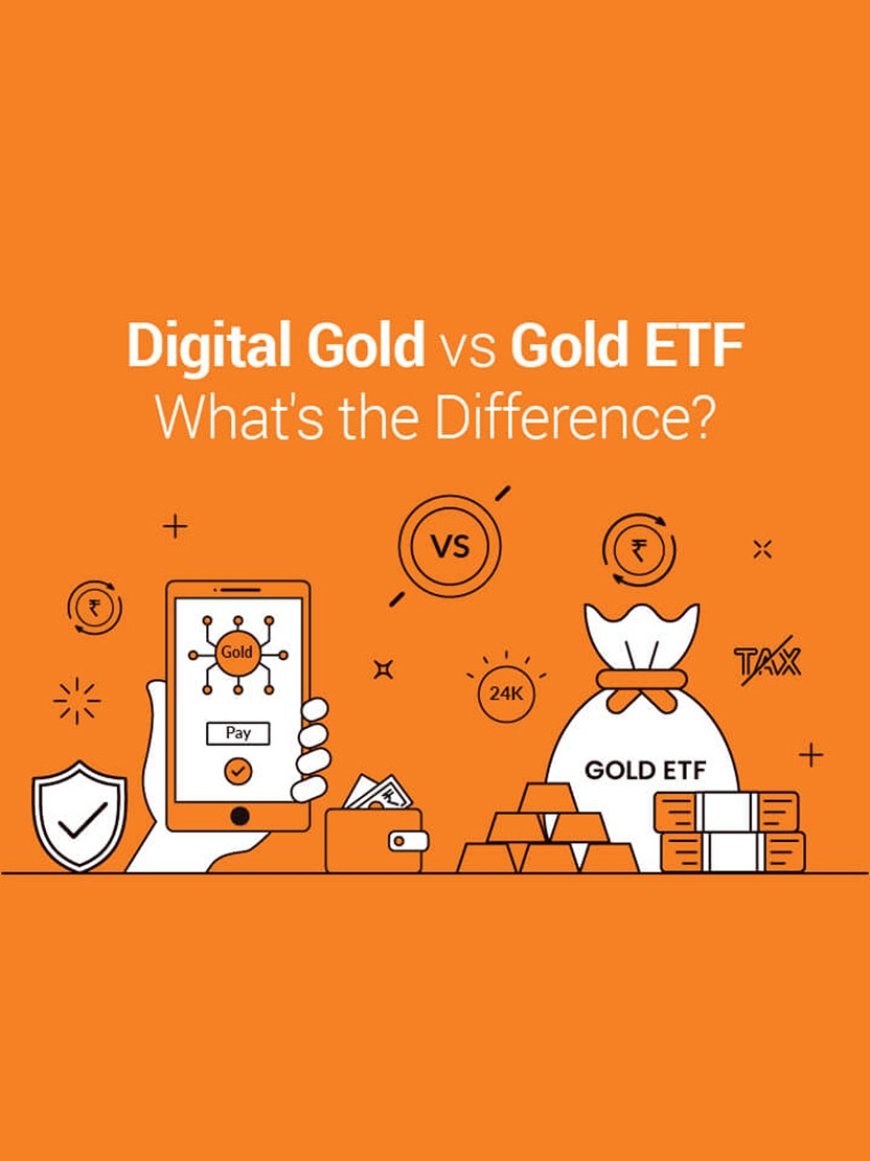Gold ETFs vs. Digital Gold: Which is Right for You?
Gold has become one of the favored investment vehicles by people looking for diversification of assets and protection against risks in an ever-changing investment landscape

Gold has become one of the favored investment vehicles by people looking for diversification of assets and protection against risks in an ever-changing investment landscape. As of this day, technology and financial innovation have birthed two fairly simple and accessible methods of investing in gold: Gold ETFs and Digital Gold.
Gold ETFs Explained
Gold ETFs would comprise open-ended mutual fund schemes that invest in standard gold bullion (99.5 percent purity) and are traded on stock exchanges like equities. This means that each unit of a Gold ETF represents, generally speaking, one gram of gold. The investors, though, will need to have a demat account and a trading account for buying and selling Gold ETF units.
Some of the key features of Gold ETFs are listed below:
- Traded on exchanges during market hours.
- Current-day prices of selling are close to those of gold.
- Require a demat and trading account.
- Subject to an expense ratio charged by the fund.
Digital Gold Explained
Digital Gold is a product offered by fintech platforms in association with gold trading companies and custodians. It lets you buy online gold at the smallest denomination, starting from ?1. The physical gold corresponding to the purchase is kept in secure vaults, with the investor having the ownership rights over the same.
Price of Gold Today and Its Impact
The gold price today closely relates to the value of both the Gold ETFs and Digital Gold. Investors mostly relate the price of gold today to their decisions for making a sale or purchase. Movements in price are driven by universal demand, supply, geopolitical tensions, inflation, and central bank policies.
Liquidity and Accessibility Comparison
Gold ETFs are liquid during stock market hours. Units can be purchased or sold on the exchange, with settlement occurring through demat accounts. Liquidity is dependent on trading volume and market depth.
Digital Gold liquidity occurs at the provider's platform. The investor may sell back his gold holdings at any time; however, liquidity terms and settlement timelines depend on the platform.
Storage and Security
Gold ETFs do not imply direct ownership of physical gold by the investor. The fund house stores the physical gold in vaults, and the management of safe custody and insurance is also its concern. Investors hold the units electronically.
In Digital Gold, the physical gold earmarked for the investor is stored in vaults by the custodian. The physical gold can be redeemed by the investor. Security measures and insurance fall under the ambit of the provider.
Costs and Charges
Gold ETFs charge an expense ratio, which covers fund management, landlord costs, and certain running costs. In addition, brokerages may apply transaction charges when buying or selling ETF units.
Digital Gold may entail a markup charge, platform fees, storage charges, and buy-sell spread; the actual cost structure varies from one provider to another.
It's advisable to compare the total charges on both Gold ETFs and Digital Gold before any purchase decision is made.
The Taxation Differences
For tax purposes, Gold ETFs will be treated as non-equity mutual funds. The gains from the sale of units held for more than three years will be classified as long-term capital gains (LTCG) and will be taxed at 20% with indexation benefit. Short-term gains will be taxed as per the investor's income tax slab.
Since it is treated as a physical asset, taxation for Digital Gold follows the same provisions as that for physical gold. LTCG will apply only after three years, and short-term will be as per the income tax slab. As for long-term holdings, the investor may claim a benefit under indexation.
Ownership and Regulation
Gold ETFs are regulated by SEBI. Mutual fund houses selling Gold ETFs are bound by investment and disclosure norms. Units are held in electronic form, giving rise to a high level of transparency and regulatory oversight.
Digital Gold lacks regulation from either SEBI or the Reserve Bank of India (RBI). Providers, however, interact with third-party custodians for the actual holding of physical gold. Terms of service and contract are solely between the investor and the provider.
Gold ETFs vs. Digital Gold: Which is Correct for You?
The decision of whether to go for Gold ETFs or Digital Gold depends on investment preferences, accessibility of financial platforms, and the expected duration of holding. Gold ETFs are for those who are already familiar with stock markets and prefer to invest in instruments that are traded on exchanges. Digital Gold is an avenue for those seeking small-ticket investments with easy buying propositions and physical delivery flexibility.
In short, the applicability of the Gold ETFs or Digital Gold will depend on how they will be purchased, their cost structure, and the investment goals. The other factors that will come into play are today's gold price and an understanding of the features of each.








































